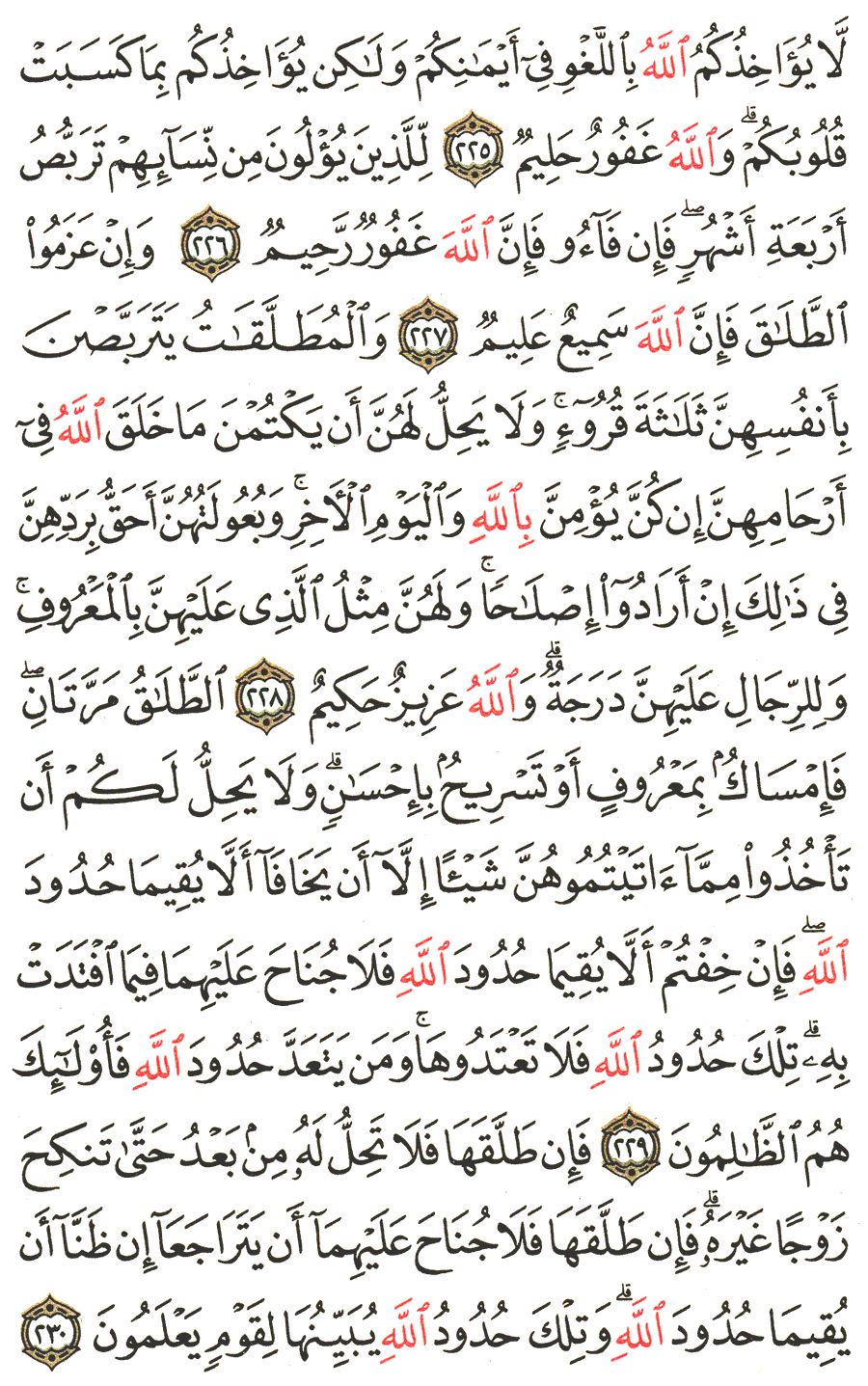Surah Al-Baqarah - سورة البقرة | reading sorat bakara Written in Arabic language with translating meanings English & from the moshaf in arabic uthmani
| Listen mp3 | Tafsir Arabic | tafsir mokhtasar |
| English | Indonesian | French |
| German | Hausa | Spanish |

English translation of the meaning Page No 36
Sura Al-Baqarah from 225 to 230
225. Allâh will not call you to account for that which is unintentional in your oaths, but He will call you to account for that which your hearts have earned. And Allâh is Oft- Forgiving, Most- Forbearing.
226. Those who take an oath [ 1 ] not to have sexual relation with their wives must wait for four months, then if they return ( change their idea in this period ) , verily, Allâh is Oft- Forgiving, Most Merciful.
227. And if they decide upon divorce, then Allâh is All- Hearer, All- Knower.
228. And divorced women shall wait ( as regards their marriage ) for three menstrual periods, and it is not lawful for them to conceal what Allâh has created in their wombs, if they believe in Allâh and the Last Day. And their husbands have the better right to take them back in that period, if they wish for reconciliation. And they ( women ) have rights ( over their husbands as regards living expenses ) similar ( to those of their husbands ) over them ( as regards obedience and respect ) to what is reasonable, but men have a degree ( of responsibility ) over them. And Allâh is All- Mighty, All- Wise.
229. The divorce is twice, after that, either you retain her on reasonable terms or release her with kindness. And it is not lawful for you ( men ) to take back ( from your wives ) any of your Mahr ( bridal- money given by the husband to his wife at the time of marriage ) which you have given them, except when both parties fear that they would be unable to keep the limits ordained by Allâh ( e.g. to deal with each other on a fair basis ) . Then if you fear that they would not be able to keep the limits ordained by Allâh, then there is no sin on either of them if she gives back ( the Mahr or a part of it ) for her Al- Khul‘ ( divorce ) [ 2 ] . These are the limits ordained by Allâh, so do not transgress them. And whoever transgresses the limits ordained by Allâh, then such are the Zâlimûn ( wrong- doers ) .
230. And if he has divorced her ( the third time ) , then she is not lawful unto him thereafter until she has married another husband. Then, if the other husband divorces her, it is no sin on both of them that they reunite, provided they feel that they can keep the limits ordained by Allâh. These are the limits of Allâh, which He makes plain for the people who have knowledge.
[1] (V.2:226) Narrated Nâfi‘: Ibn ‘Umar used to say about Al-’Îla’ which Allâh defined (in the Holy Book), "If the period of Al-’Îla’ expires, then the husband has either to retain his wife in a handsome manner or to divorce her as Allâh [(Lord Almighty and Exalted)] has ordered." Ibn ‘Umar added, "When the period of four months has expired, the husband should divorce his wife, but the divorce does not occur unless the husband himself declares it. This has been mentioned by ‘Uthmân, ‘Alî, Abu Ad-Dardâ’, ‘Âishah and twelve other Companions of the Prophet (saas) (Sahih Al-Bukhâri, Vol.7, Hadîth No. 213).
* Al- ’Îla’ : means the oath taken by a husband that he would not approach his wife for a certain period.
[2] (V.2:229) Al-Khul‘ * and how a divorce is given according to it.
Narrated Ibn ‘Abbâs ( raa ) : The wife of Thâbit bin Qais came to the Prophet ( saas ) and said, « O Allâh’s Messenger! I do not blame Thâbit for defects in his character or his religion, but I, being a Muslim, dislike to behave in an un- Islâmic manner ( if I remain with him ) » . On that Allâh’s Messenger ( saas ) said ( to her ) , « Will you give back the garden which your husband has given you as Mahr ) ? » She said, « Yes. » Then the Prophet ( saas ) said to Thâbit, « O Thabît! Accept your garden, and divorce her once. » ( Sahih Al- Bukhâri, Vol.7, Hadîth No. 197 ) .
* Al- Khul‘ means the parting of a wife from her husband by giving him a certain compensation.










Page No 36 Download and Listen mp3